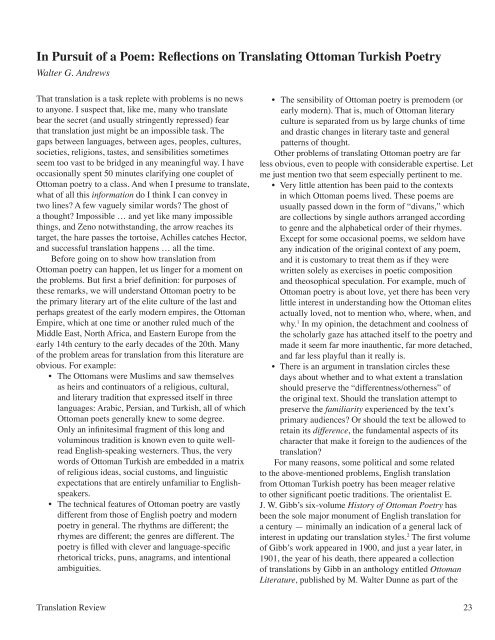Translation Review - The University of Texas at Dallas
Translation Review - The University of Texas at Dallas
Translation Review - The University of Texas at Dallas
Create successful ePaper yourself
Turn your PDF publications into a flip-book with our unique Google optimized e-Paper software.
In Pursuit <strong>of</strong> a Poem: Refl ections on Transl<strong>at</strong>ing Ottoman Turkish Poetry<br />
Walter G. Andrews<br />
Th<strong>at</strong> transl<strong>at</strong>ion is a task replete with problems is no news<br />
to anyone. I suspect th<strong>at</strong>, like me, many who transl<strong>at</strong>e<br />
bear the secret (and usually stringently repressed) fear<br />
th<strong>at</strong> transl<strong>at</strong>ion just might be an impossible task. <strong>The</strong><br />
gaps between languages, between ages, peoples, cultures,<br />
societies, religions, tastes, and sensibilities sometimes<br />
seem too vast to be bridged in any meaningful way. I have<br />
occasionally spent 50 minutes clarifying one couplet <strong>of</strong><br />
Ottoman poetry to a class. And when I presume to transl<strong>at</strong>e,<br />
wh<strong>at</strong> <strong>of</strong> all this inform<strong>at</strong>ion do I think I can convey in<br />
two lines? A few vaguely similar words? <strong>The</strong> ghost <strong>of</strong><br />
a thought? Impossible … and yet like many impossible<br />
things, and Zeno notwithstanding, the arrow reaches its<br />
target, the hare passes the tortoise, Achilles c<strong>at</strong>ches Hector,<br />
and successful transl<strong>at</strong>ion happens … all the time.<br />
Before going on to show how transl<strong>at</strong>ion from<br />
Ottoman poetry can happen, let us linger for a moment on<br />
the problems. But fi rst a brief defi nition: for purposes <strong>of</strong><br />
these remarks, we will understand Ottoman poetry to be<br />
the primary literary art <strong>of</strong> the elite culture <strong>of</strong> the last and<br />
perhaps gre<strong>at</strong>est <strong>of</strong> the early modern empires, the Ottoman<br />
Empire, which <strong>at</strong> one time or another ruled much <strong>of</strong> the<br />
Middle East, North Africa, and Eastern Europe from the<br />
early 14th century to the early decades <strong>of</strong> the 20th. Many<br />
<strong>of</strong> the problem areas for transl<strong>at</strong>ion from this liter<strong>at</strong>ure are<br />
obvious. For example:<br />
• <strong>The</strong> Ottomans were Muslims and saw themselves<br />
as heirs and continu<strong>at</strong>ors <strong>of</strong> a religious, cultural,<br />
and literary tradition th<strong>at</strong> expressed itself in three<br />
languages: Arabic, Persian, and Turkish, all <strong>of</strong> which<br />
Ottoman poets generally knew to some degree.<br />
Only an infi nitesimal fragment <strong>of</strong> this long and<br />
voluminous tradition is known even to quite wellread<br />
English-speaking westerners. Thus, the very<br />
words <strong>of</strong> Ottoman Turkish are embedded in a m<strong>at</strong>rix<br />
<strong>of</strong> religious ideas, social customs, and linguistic<br />
expect<strong>at</strong>ions th<strong>at</strong> are entirely unfamiliar to Englishspeakers.<br />
• <strong>The</strong> technical fe<strong>at</strong>ures <strong>of</strong> Ottoman poetry are vastly<br />
different from those <strong>of</strong> English poetry and modern<br />
poetry in general. <strong>The</strong> rhythms are different; the<br />
rhymes are different; the genres are different. <strong>The</strong><br />
poetry is fi lled with clever and language-specifi c<br />
rhetorical tricks, puns, anagrams, and intentional<br />
ambiguities.<br />
• <strong>The</strong> sensibility <strong>of</strong> Ottoman poetry is premodern (or<br />
early modern). Th<strong>at</strong> is, much <strong>of</strong> Ottoman literary<br />
culture is separ<strong>at</strong>ed from us by large chunks <strong>of</strong> time<br />
and drastic changes in literary taste and general<br />
p<strong>at</strong>terns <strong>of</strong> thought.<br />
Other problems <strong>of</strong> transl<strong>at</strong>ing Ottoman poetry are far<br />
less obvious, even to people with considerable expertise. Let<br />
me just mention two th<strong>at</strong> seem especially pertinent to me.<br />
• Very little <strong>at</strong>tention has been paid to the contexts<br />
in which Ottoman poems lived. <strong>The</strong>se poems are<br />
usually passed down in the form <strong>of</strong> “divans,” which<br />
are collections by single authors arranged according<br />
to genre and the alphabetical order <strong>of</strong> their rhymes.<br />
Except for some occasional poems, we seldom have<br />
any indic<strong>at</strong>ion <strong>of</strong> the original context <strong>of</strong> any poem,<br />
and it is customary to tre<strong>at</strong> them as if they were<br />
written solely as exercises in poetic composition<br />
and theosophical specul<strong>at</strong>ion. For example, much <strong>of</strong><br />
Ottoman poetry is about love, yet there has been very<br />
little interest in understanding how the Ottoman elites<br />
actually loved, not to mention who, where, when, and<br />
why. 1 In my opinion, the detachment and coolness <strong>of</strong><br />
the scholarly gaze has <strong>at</strong>tached itself to the poetry and<br />
made it seem far more inauthentic, far more detached,<br />
and far less playful than it really is.<br />
• <strong>The</strong>re is an argument in transl<strong>at</strong>ion circles these<br />
days about whether and to wh<strong>at</strong> extent a transl<strong>at</strong>ion<br />
should preserve the “differentness/otherness” <strong>of</strong><br />
the original text. Should the transl<strong>at</strong>ion <strong>at</strong>tempt to<br />
preserve the familiarity experienced by the textʼs<br />
primary audiences? Or should the text be allowed to<br />
retain its difference, the fundamental aspects <strong>of</strong> its<br />
character th<strong>at</strong> make it foreign to the audiences <strong>of</strong> the<br />
transl<strong>at</strong>ion?<br />
For many reasons, some political and some rel<strong>at</strong>ed<br />
to the above-mentioned problems, English transl<strong>at</strong>ion<br />
from Ottoman Turkish poetry has been meager rel<strong>at</strong>ive<br />
to other signifi cant poetic traditions. <strong>The</strong> orientalist E.<br />
J. W. Gibbʼs six-volume History <strong>of</strong> Ottoman Poetry has<br />
been the sole major monument <strong>of</strong> English transl<strong>at</strong>ion for<br />
a century — minimally an indic<strong>at</strong>ion <strong>of</strong> a general lack <strong>of</strong><br />
interest in upd<strong>at</strong>ing our transl<strong>at</strong>ion styles. 2 <strong>The</strong> fi rst volume<br />
<strong>of</strong> Gibbʼs work appeared in 1900, and just a year l<strong>at</strong>er, in<br />
1901, the year <strong>of</strong> his de<strong>at</strong>h, there appeared a collection<br />
<strong>of</strong> transl<strong>at</strong>ions by Gibb in an anthology entitled Ottoman<br />
Liter<strong>at</strong>ure, published by M. Walter Dunne as part <strong>of</strong> the<br />
<strong>Transl<strong>at</strong>ion</strong> <strong>Review</strong> 23

















